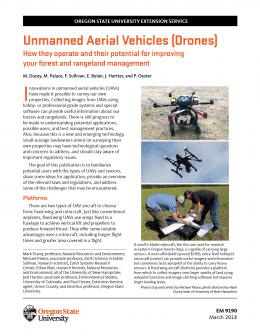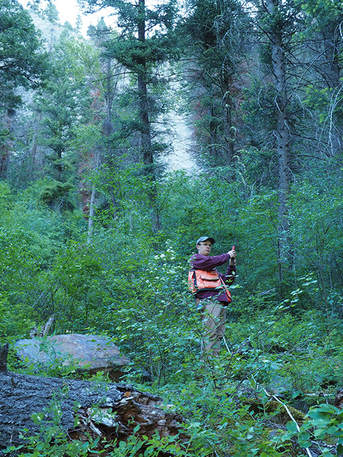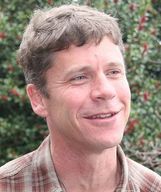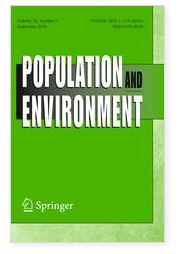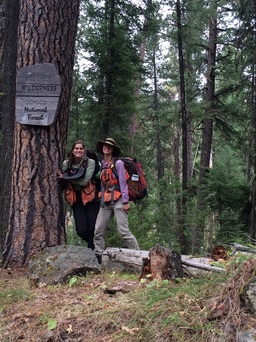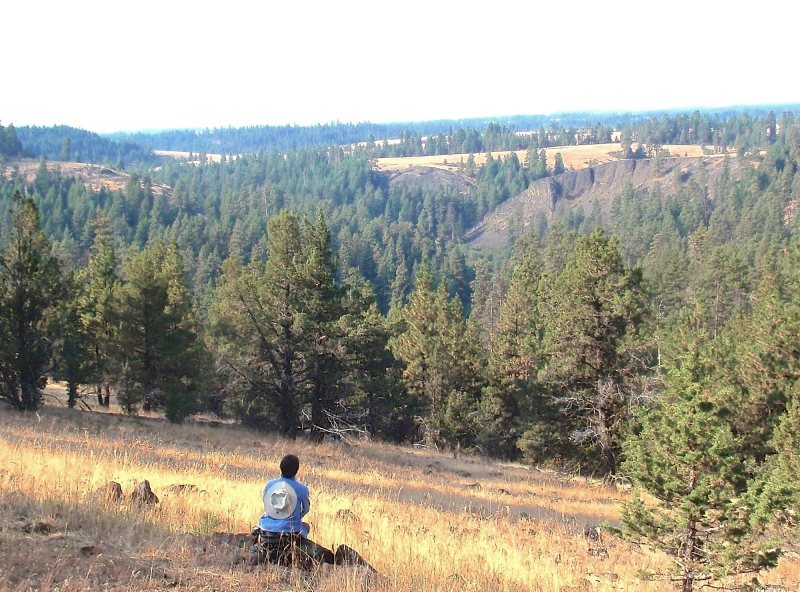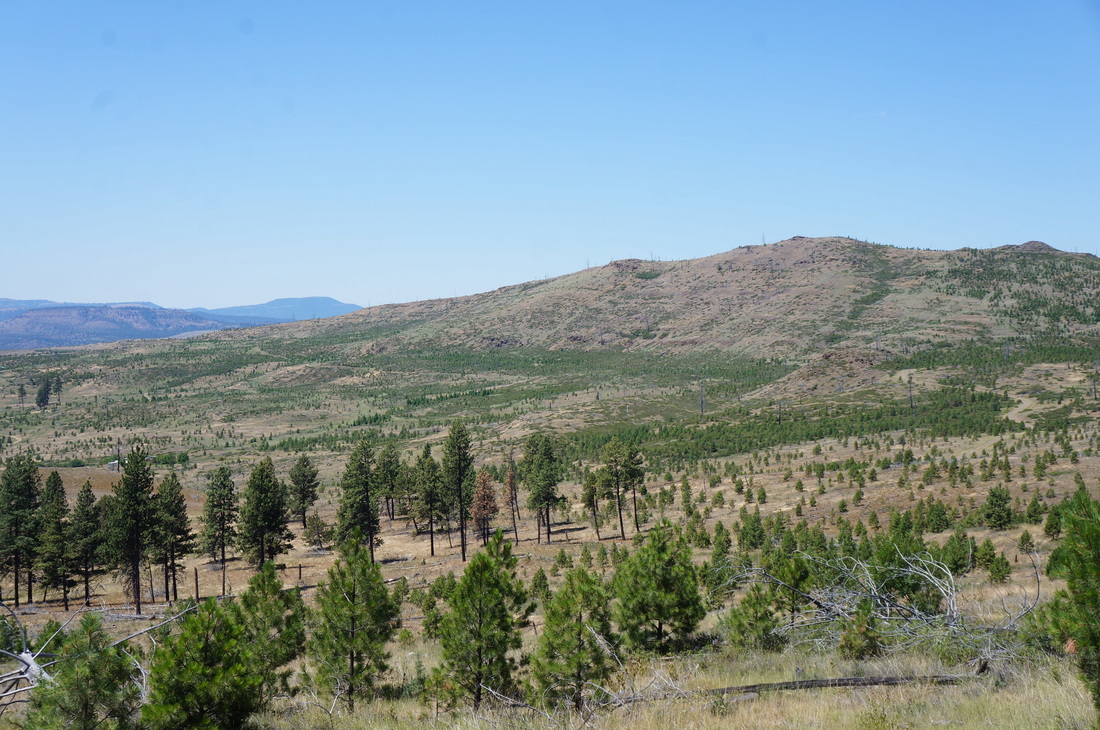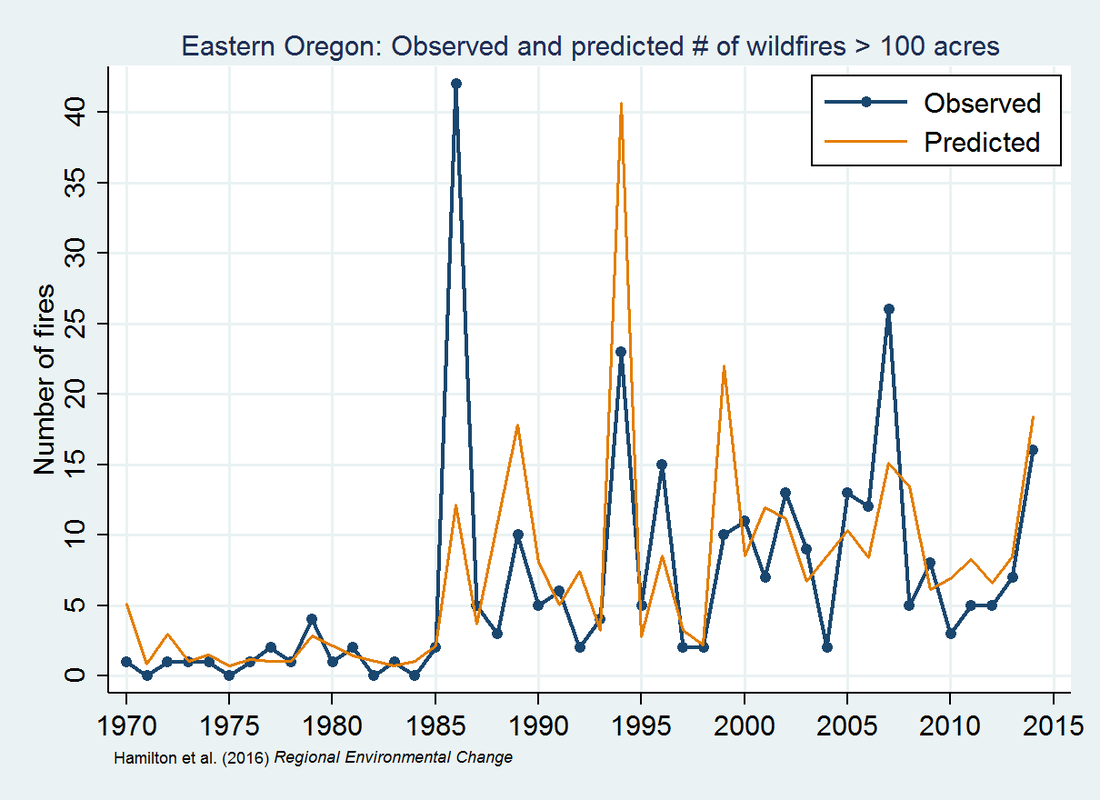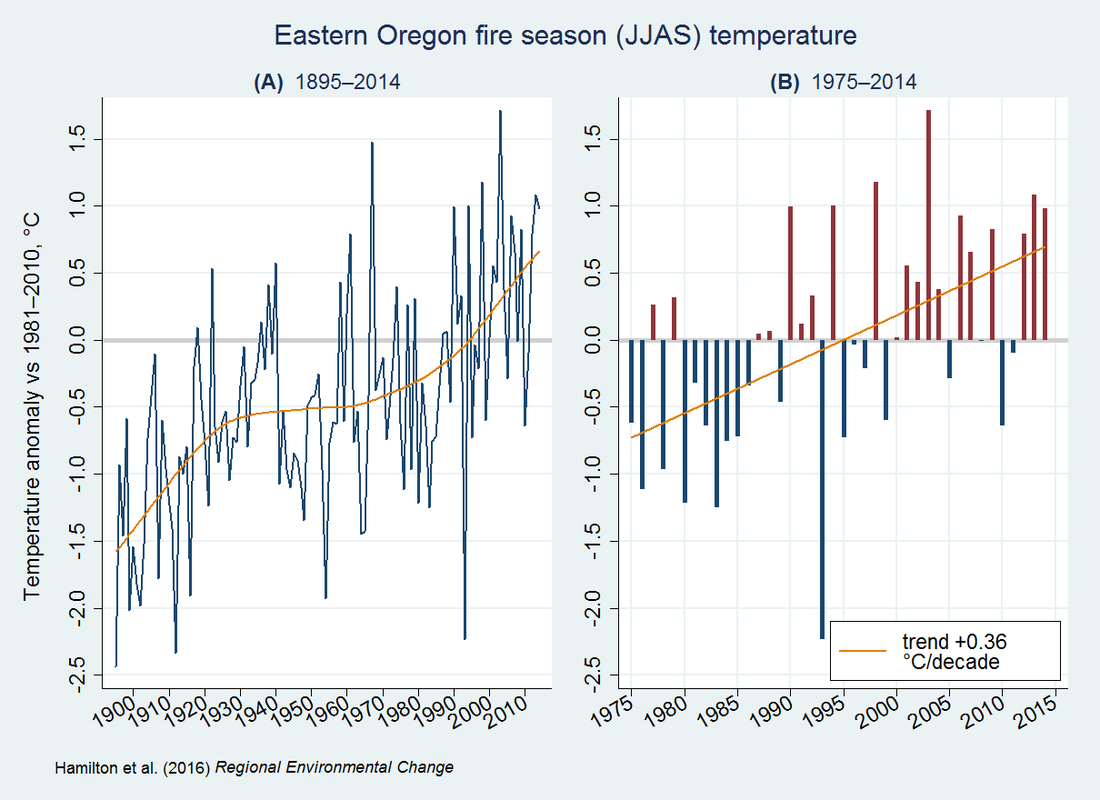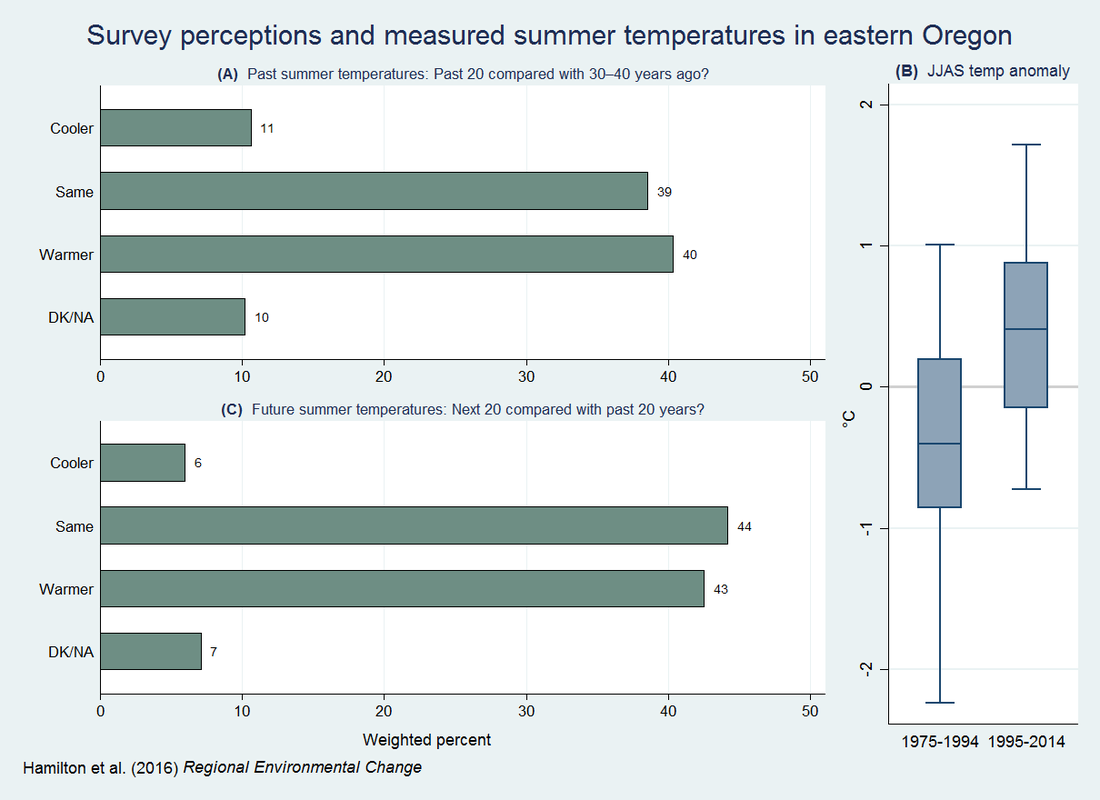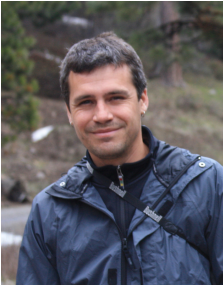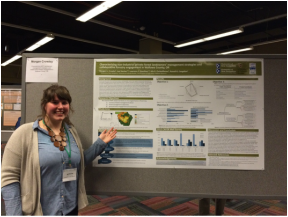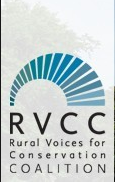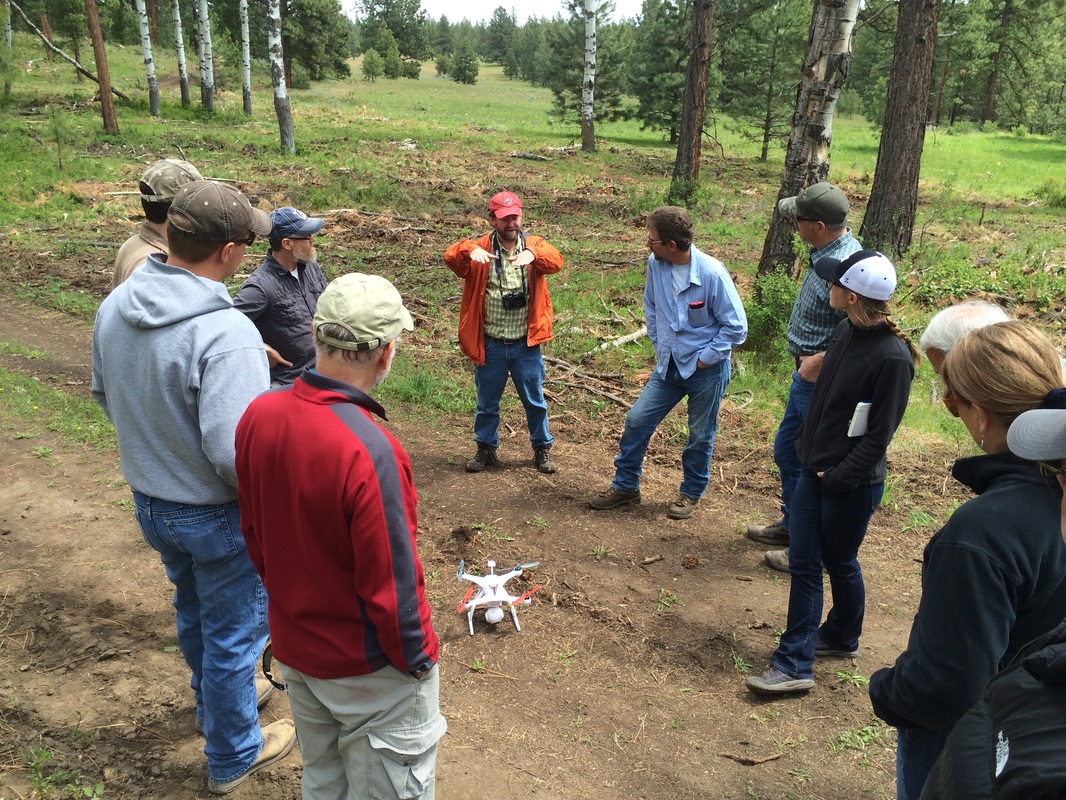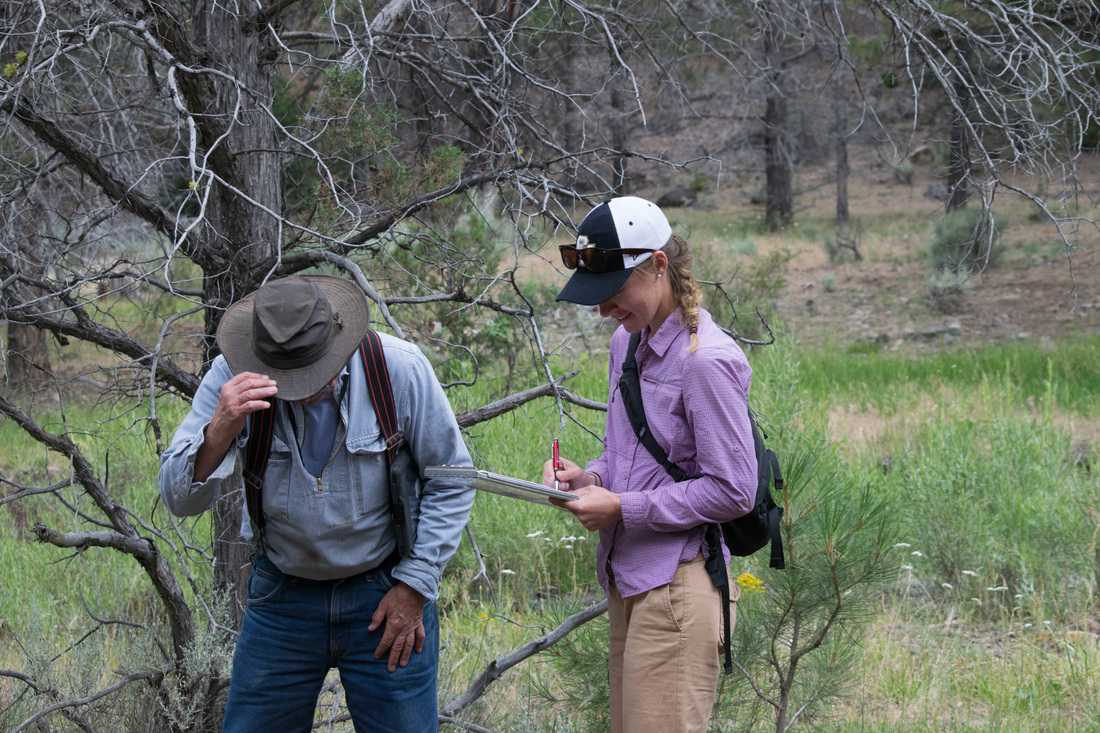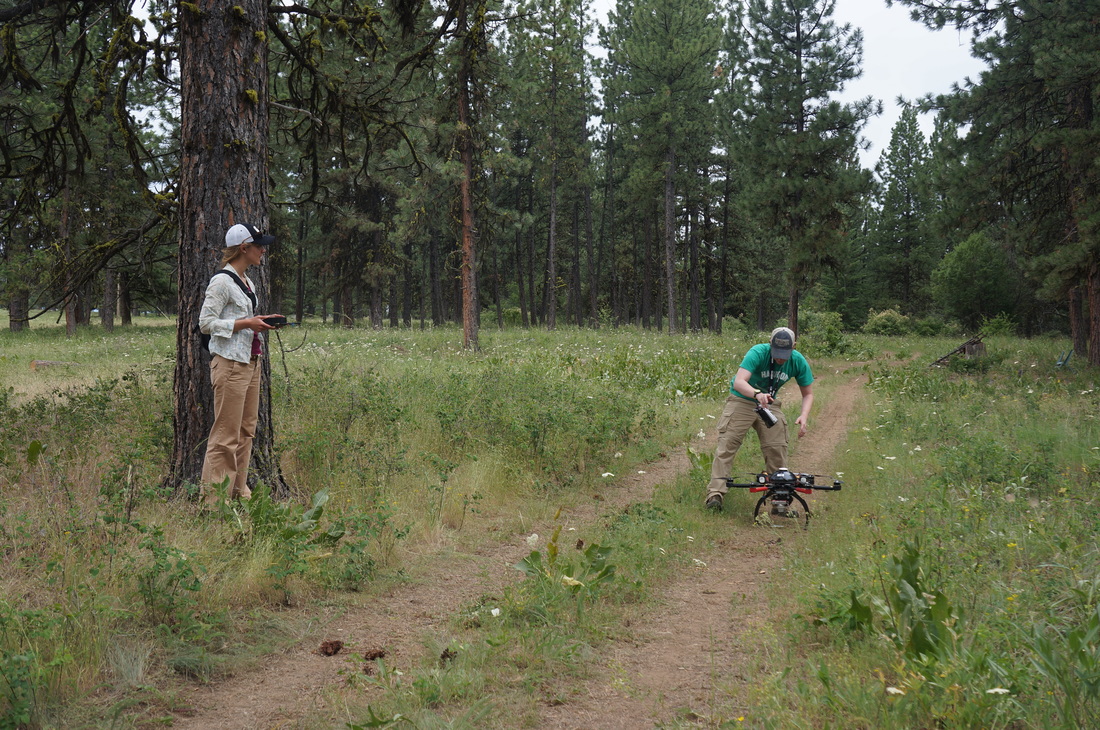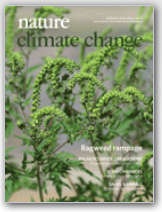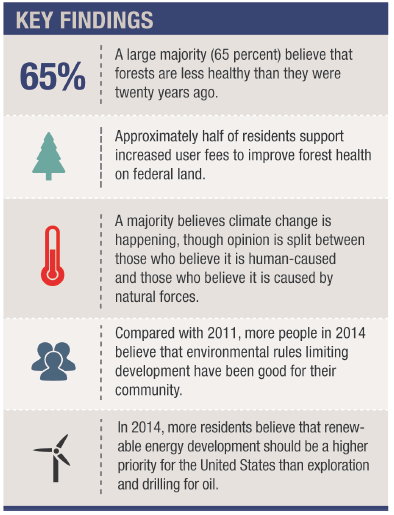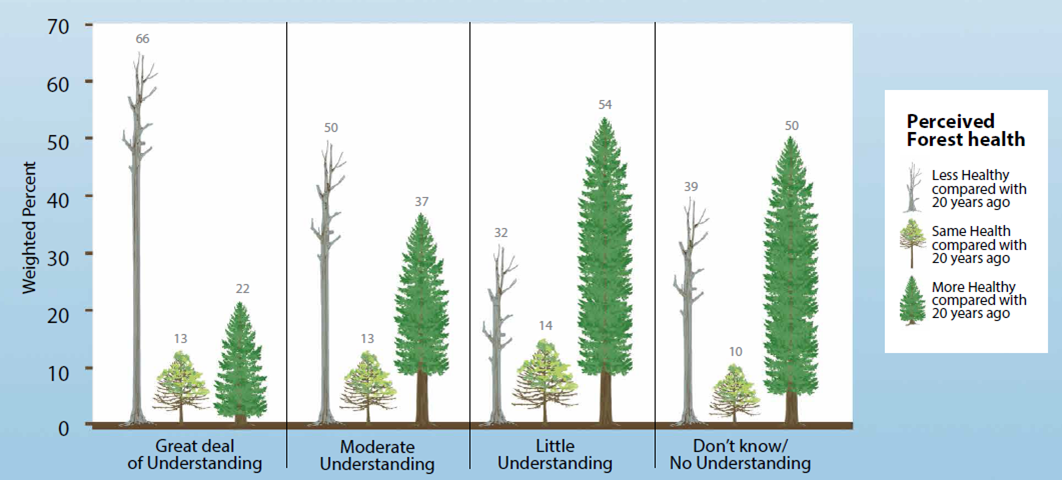PROJECT NEWS & UPDATES
|
March 9, 2018
New publication highlighting use of unmanned aerial vehicles (drones) for rangeland and forestry applications through Oregon State University Extension Service. Find the publication here. |
October 17, 2017
Drier Conditions, More Wildfire, and Heightened Concerns About Forest Management in Eastern Oregon
This brief examines climate change and forest conditions in eastern Oregon. Eastern Oregon is experiencing warmer, drier conditions and increased numbers of wildfires. Surveys of the Oregon public find that forest health and wildfire threats are widely shared concerns. The more knowledgeable residents say they are about forest management, the more likely they are to say that forests are becoming less healthy. Read the press release. Read the brief.
Drier Conditions, More Wildfire, and Heightened Concerns About Forest Management in Eastern Oregon
This brief examines climate change and forest conditions in eastern Oregon. Eastern Oregon is experiencing warmer, drier conditions and increased numbers of wildfires. Surveys of the Oregon public find that forest health and wildfire threats are widely shared concerns. The more knowledgeable residents say they are about forest management, the more likely they are to say that forests are becoming less healthy. Read the press release. Read the brief.
|
August 31, 2017
Successful field season! Ethan Belair and Frankie Sullivan, with field assistance from Angela Boag, Michael Procko, and Mark Ducey, conducted a field campaign within the proposed Lostine Corridor public safety project area. The results of this field campaign will be used for validation of regional forest structure maps being developed by Frankie along with Michael Palace. |
|
Wallowa Resources executive director and CAFOR collaborator Nils Christoffersen lends provides his thoughts about climate change, wildfire, and forest management in Wallowa County. Guest Column: Forest projects help ‘bend the climate curve’ in Wallowa County. Wallowa County Chieftain, August 8, 2017. See the article here.
|
|
May 22, 2017
PhD Candidate Angela Boag awarded Graduate Research Innovation Award CAFOR graduate research assistant and PhD candidate Angela Boag was awarded the Graduate Research Innovation (GRIN) Award by the Joint Fire Science Program. Her project, "Impacts of multi-year drought on post-fire conifer regeneration in eastern Oregon" will focus on four wildfires in the Blue Mountains. This award will continue to support her dissertation research and outreach activities. Congratulations Angela! |
|
September 23, 2016
New paper examining changing public opinion on climate change, wind energy, and wolves in eastern Oregon A new study released in the journal Population & Environment led by PhD candidate Angela Boag examines public opinions about climate change, renewable energy, and wolves in Baker, Union, and Wallowa counties, Oregon. Based on cross-sectional telephone survey data collected in 2011 and 2014, our observations suggest declining support for eliminating wolves, increased support for renewable energy, and increasingly favorable views of regulations that limit development in rural landscapes. We find that while demographic change and local events contribute to some of the observed shifts in opinion on wolves, exogenous factors acting at state and national levels likely contribute to shifting opinions on climate change, renewable energy, and land use regulations. Link to the article here. |
|
August 23, 2016
Another successful field season completed PhD Candidate Angela Boag is studying whether post-fire drought severity in the 2-3 years following fire affects natural regeneration in eastern Oregon, as has been suggested in other regions. Along with her field assistant Leah Bollin, Angela sampled natural post-fire conifer regeneration in four fires over eight weeks, two that burned in 1996 and 2000 respectively in the Umatilla and Ochoco National Forests. These data will provide new information about post fire recovery in hot-dry forest types. |
|
May 24, 2016
Restoring our forests in the face of climate change Climate trends in northeast Oregon and Washington are leading to extended late season drought and longer wildfire seasons – and the forests are losing against these conditions. The 2015 fire season set the record as the worst in U.S. history, totaling over 10 million acres burned nationally. The Blue Mountains alone reported more than 282,000 acres burned in wildfires. CAFOR research is featured in the latest issue. This is the fifth of twelve issues of Features from the Blue Mountains Restoration Strategy brought to you by Sustainable Northwest and the U.S. Forest Service Blue Mountains Restoration Strategy Team. Link to the blog here: http://www.sustainablenorthwest.org/blog/posts/restoring-our-forests-in-the-face-of-climate-change |
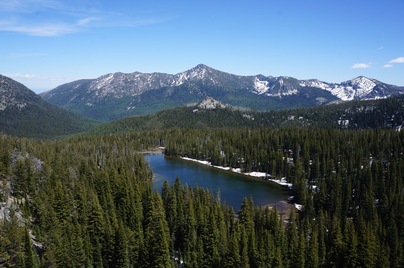
April 27, 2016
CU Students: Work with us!
The Communities and Forests in Oregon (CAFOR) project is seeking a summer field assistant for two months, June 20th - August 19th. The assistant will help a PhD student conduct post-fire forest regeneration surveys in the Blue Mountains of northeast Oregon.
Qualifications:
Description of Work: Daily duties will include setting transects, counting and measuring trees, recording data and taking notes. Accommodation will be mostly camping with occasional motel stays. Note: This region of eastern Oregon is far from large urban centers or airports, so it's difficult to get away on weekends, but has lots of great hiking and weekend summer festivals in towns like John Day, Baker City and Enterprise.
Compensation: In addition to $11.50/hr for 40 hrs per week, CAFOR provides a grocery allowance, transportation to/from Oregon, and camping/motel accommodation. The assistant will also gain experience conducting field research.
To Apply: Please send a cover letter and resume to [email protected] by May 9th at 5 pm, and don't hesitate to get in touch with any questions you have.
CU Students: Work with us!
The Communities and Forests in Oregon (CAFOR) project is seeking a summer field assistant for two months, June 20th - August 19th. The assistant will help a PhD student conduct post-fire forest regeneration surveys in the Blue Mountains of northeast Oregon.
Qualifications:
- Must have experience backcountry camping for multiple nights
- Willing to work outdoors in challenging conditions (rain, cold, hot weather) as well as unconventional hours (i.e. early mornings or evenings) to avoid hazards like extremely hot weather
- Physically fit enough to hike several miles a day in rugged terrain
- Willing to spend multiple days camping with little cellphone coverage
Description of Work: Daily duties will include setting transects, counting and measuring trees, recording data and taking notes. Accommodation will be mostly camping with occasional motel stays. Note: This region of eastern Oregon is far from large urban centers or airports, so it's difficult to get away on weekends, but has lots of great hiking and weekend summer festivals in towns like John Day, Baker City and Enterprise.
Compensation: In addition to $11.50/hr for 40 hrs per week, CAFOR provides a grocery allowance, transportation to/from Oregon, and camping/motel accommodation. The assistant will also gain experience conducting field research.
To Apply: Please send a cover letter and resume to [email protected] by May 9th at 5 pm, and don't hesitate to get in touch with any questions you have.
|
February 26, 2016
Even local warming perceptions are colored by ideology "Worsening wildfires endanger communities. Invasive insects imperil forests. In the American West, many worry about these threats — but fewer fret about climate change, a major force behind both the burning and the bugs," says blogger Andrew Urevig @aurevig. Full post found here. |
|
February 5, 2016
Wildfire, climate, and perceptions in Northeast Oregon A new study released in the journal Regional Environmental Change examines local perceptions of wildfire and the connection to climate change in the Blue Mountains. A 2011 survey found area residents highly concerned about fire and insect threats, but not about climate change. In 2014 we conducted a second survey that, to explore this apparent disconnect, included questions about past and future summertime (fire season) temperatures. Although regional temperatures have warmed in recent decades at twice the global rate, accompanied by increasing dryness and fire risks, the warming itself is recognized by only 40% of our respondents. Awareness of recent warming proves unrelated to individual characteristics that might indicate experience on the land: old-timer versus newcomer status, year-round versus seasonal residence, and ownership of forested land. Perceptions of past warming and expectations of future warming are more common among younger respondents and less common among Tea Party supporters. The best-educated partisans stand farthest apart. Perceptions about local temperatures that are important for adaptation planning thus follow ideological patterns similar to beliefs about global climate change. Link to the article here. |
|
February 2016
Public Support for Active Forest Management in Eastern Oregon Forests Grows Following the disastrous 2015 fire season, we conducted a telephone survey in October and November of residents in Union, Baker, Wallowa, Crook, Wheeler, Grant, and Umatilla counties. Sixty-five percent of the respondents said that “active management for national forests, with some tree thinning and/or grazing,” should be a high priority for land management in northeast Oregon. That 65% represents a modest but statistically significant increase from the 57% who gave this answer on an earlier survey in summer/fall 2014. CAFOR work featured in the Central and Eastern Oregon Forestry and Natural Resources Extension newsletter. You can find the article here. |
|
December, 2015
Congratulations to co-Investigator Dr. Forrest Stevens who has successfully defended his PhD dissertation at the University of Florida, Department of Geography. Forrest has co-developed many of the research objectives for CAFOR and has been there since the program began in 2008. Awesome work Forrest! |
|
December 11, 2015
Congratulations to Morgan Crowley on a job well done in finishing her MS thesis "Non-Industrial Private Forest Landowner Engagement and Amenity-Driven Migration in Widlfire-Prone Landscapes of the Inland Northwest" at the University of New Hampshire. Rural counties in the Inland Northwest have a "working lands" culture that supports livelihoods dependent on the health of wildfire-prone private and public forests. Wildfires threaten economic livelihoods and exacerbate the challenges of working landscapes impacted by changing economies, demographic trends, and forest conditions. The main objectives of Morgan's thesis were to investigate: 1) what comprises amenity-driven migration and how are amenity-driven migration and wildfire severity related?; 2) are amenity-driven migrants engaged in forest management activities in Wallowa County, Oregon and what is forest management engagement?; 3) how does landowner parcel proximity from WUI, USFS land relate to perspectives of healthy forest, wildfire risk and how do geographic characteristics of amenity-driven migration relate to landowner perceptions of forest community transitions? |
|
December 8-10, 2015
Rural Voices for Conservation Coalition Nils Christoffersen represented CAFOR at the RVCC Annual Meeting in Troutdale, OR. Organized by Sustainable Northwest, the RVCC’s Annual Meeting provides an opportunity for participants to connect, engage, inspire, and develop solutions with partners working on rural conservation and economic development across the West. You can view our poster here. |

July 2015
Paving the Way for New Opportunities: The CAFOR Project. Read about the CAFOR's partnership with Wallowa Resources here.
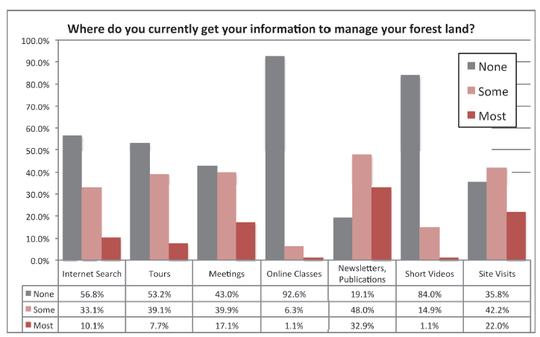
February 11, 2015
Opinions about public lands and the actions of private non-industrial forest owners in the western United States play important roles in forested landscape management as both public and private forests face increasing risks from large wildfires, pests and disease. This work presents the responses from two surveys, a random-sample telephone survey of more than 1500 residents in northeast Oregon. Based on our results we argue that self-assessed understanding, interest in learning, and willingness to engage in extension activities together have leverage to affect perceptions about the risks posed by declining forest conditions on public lands, influence land owner actions, and affect support for public policies. Access the article in PLOS ONE free here. 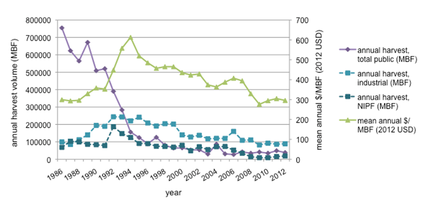
January 23, 2015
A quarter century of log price and harvest data show market fluctuations in eastern Oregon. Read more from CAFOR researcher Angela Boag in this month's Blue Mountains Renewable Resources Newsletter here.
|
|
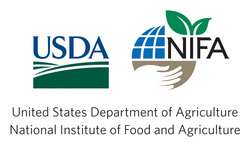
April 22, 2014
BIG NEWS! CAFOR study funded through the USDA to study climate change in 7 counties in eastern OR. Work will now expand to cover much of the Blue Mountains Province.
USDA Awards Research Grants to Address the Impact of Climate Change on U.S. Agriculture Production
UNH Receives Grant to Study Climate Change Adaptation in Wildfire-Prone Area
BIG NEWS! CAFOR study funded through the USDA to study climate change in 7 counties in eastern OR. Work will now expand to cover much of the Blue Mountains Province.
USDA Awards Research Grants to Address the Impact of Climate Change on U.S. Agriculture Production
UNH Receives Grant to Study Climate Change Adaptation in Wildfire-Prone Area
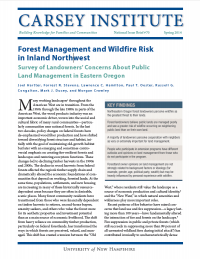
April 8, 2014
How do forest landowners feel about local land management practices? This brief reports the results of a mail survey of forest landowners in northeastern Oregon conducted in the fall of 2012 by the Communities and Forests in Oregon (CAFOR) Project at the University of Colorado and the University of New Hampshire in cooperation with Oregon State University College of Forestry Extension. The mail survey was administered to understand who constituted forest landowners in these three counties and their perceptions about forest management on both public and private land, as well as risks to forests in the area and the actions they have taken to reduce those risks.
Read the issue brief: Forest Management and Wildfire Risk in Inland Northwest
How do forest landowners feel about local land management practices? This brief reports the results of a mail survey of forest landowners in northeastern Oregon conducted in the fall of 2012 by the Communities and Forests in Oregon (CAFOR) Project at the University of Colorado and the University of New Hampshire in cooperation with Oregon State University College of Forestry Extension. The mail survey was administered to understand who constituted forest landowners in these three counties and their perceptions about forest management on both public and private land, as well as risks to forests in the area and the actions they have taken to reduce those risks.
Read the issue brief: Forest Management and Wildfire Risk in Inland Northwest

April 5, 2014
Incoming CAFOR PhD student Angela Boag was awarded a NSERC graduate fellowship from the Canadian government for her project, "Planning for future threats: combining climate and land use change projections to optimize the effectiveness of land conservation." Congratulations Angela!
Incoming CAFOR PhD student Angela Boag was awarded a NSERC graduate fellowship from the Canadian government for her project, "Planning for future threats: combining climate and land use change projections to optimize the effectiveness of land conservation." Congratulations Angela!
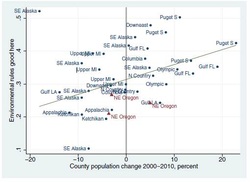
September 18, 2013
CAFOR researchers publish study on environmental concerns in the journal Rural Sociology.
You can find a link here: http://onlinelibrary.wiley.com/doi/10.1111/ruso.12023/abstract
CAFOR researchers publish study on environmental concerns in the journal Rural Sociology.
You can find a link here: http://onlinelibrary.wiley.com/doi/10.1111/ruso.12023/abstract
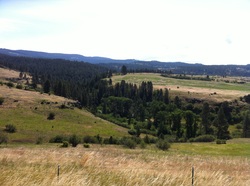
April 2013
CAFOR investigator Joel Hartter in Pendleton, OR for the annual Oregon Society of American Foresters meeting. This conference focused on forestry in eastern OR. Joel's presentation can be found here
CAFOR investigator Joel Hartter in Pendleton, OR for the annual Oregon Society of American Foresters meeting. This conference focused on forestry in eastern OR. Joel's presentation can be found here
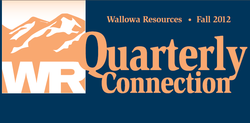
CAFOR featured in FAll 2012 Wallowa Resources newsletter.
Research Uncovers Social Attitudes Toward Changing Forests
Research Uncovers Social Attitudes Toward Changing Forests
August 2012
Congratulations to Dan Maynard and Mickey Campbell on completing the MS Natural Resources degrees and their contribution to CAFOR.
Congratulations to Dan Maynard and Mickey Campbell on completing the MS Natural Resources degrees and their contribution to CAFOR.
Commentary on UNH research in Oregon in the LaGrande Observer. July 16, 2012.
Forest Views: Northeast Oregon Survey Looks at Community and Environment. Carsey Report. April 24, 2012.
Baker City Herald, June 23, 2011
Wallowa County Chieftain, June 23, 2011
Carsey Institute Researchers to Survey Oregon Residents on Views about Community and Forest, September 2, 2011
LaGrande Observer, June 15, 2011
Forest Views: Northeast Oregon Survey Looks at Community and Environment. Carsey Report. April 24, 2012.
Baker City Herald, June 23, 2011
Wallowa County Chieftain, June 23, 2011
Carsey Institute Researchers to Survey Oregon Residents on Views about Community and Forest, September 2, 2011
LaGrande Observer, June 15, 2011
